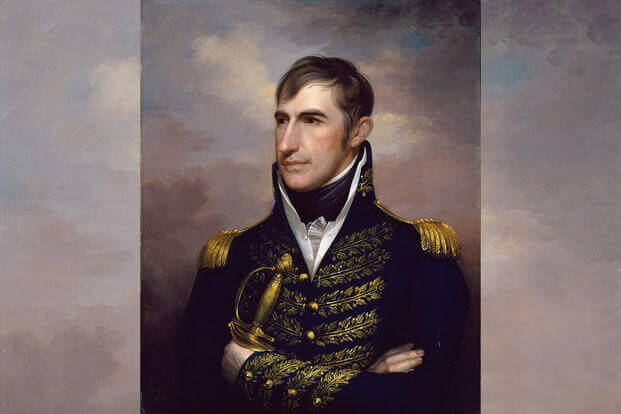Felled by illness a month after delivering history's longest inaugural speech, President William Henry Harrison left little legacy as commander-in-chief. But as Supreme Commander of the Army of the Northwest, "Old Tippecanoe" secured the Northwest from British invasion and a place for himself in history.
Whig supporters painted candidate Harrison as "Old Tippecanoe" — war-toughened, folksy, and hard drinking — to contrast him with the aristocratic Martin Van Buren. In reality, Harrison came from old Virginia stock and money. His background convinced him that states should have the right to decide slaveholding policies for themselves.
Harrison's early career as a medical student in his home state took a sudden turn when "Indian atrocities" angered him and he joined the Army as a sublieutenant. As aide-de-camp to Gen. Anthony Wayne, Harrison distinguished himself at the Battle of Fallen Timbers in 1794 and was promoted to captain before resigning in 1798.
Harrison embarked on his political career, but that career was destined to intertwine with his military side again. President John Adams appointed him secretary of Indian affairs for the Northwest and Indiana territories. Harrison quickly pleased his constituents by calling for the Land Act of 1800, which specified that all public lands should be divided into small homestead lots.
That which endeared him to voters incited the region's Indians to create a tribal confederation against further land sales. Shawnee chief Tecumseh and his brother, the prophet Tenskwatana, established a political and military center just north of modern-day Lafayette, Ind., near the Keth-tip-pe-can-nunk — or Tippecanoe — river.
Harrison, by this time governor and superintendent of Indian affairs for Indiana, met with Tecumseh first here, forcing an Indian withdrawal with his 1,000 militiamen and volunteers. This defeat is widely acknowledged as the beginning of the end to American Indian resistance to U.S. westward expansion.
Harrison's path crossed Tecumseh's again. After Tippecanoe, the Indian confederation allied itself with the British, supporting them in the War of 1812. Now a general officer and supreme commander of the Army of the Northwest, Harrison defeated the allies at the Battle of the Thames near Thomasville, Ohio, on Oct. 5, 1813. This battle resulted in the flight of the British commander and the death of Tecumseh.
















